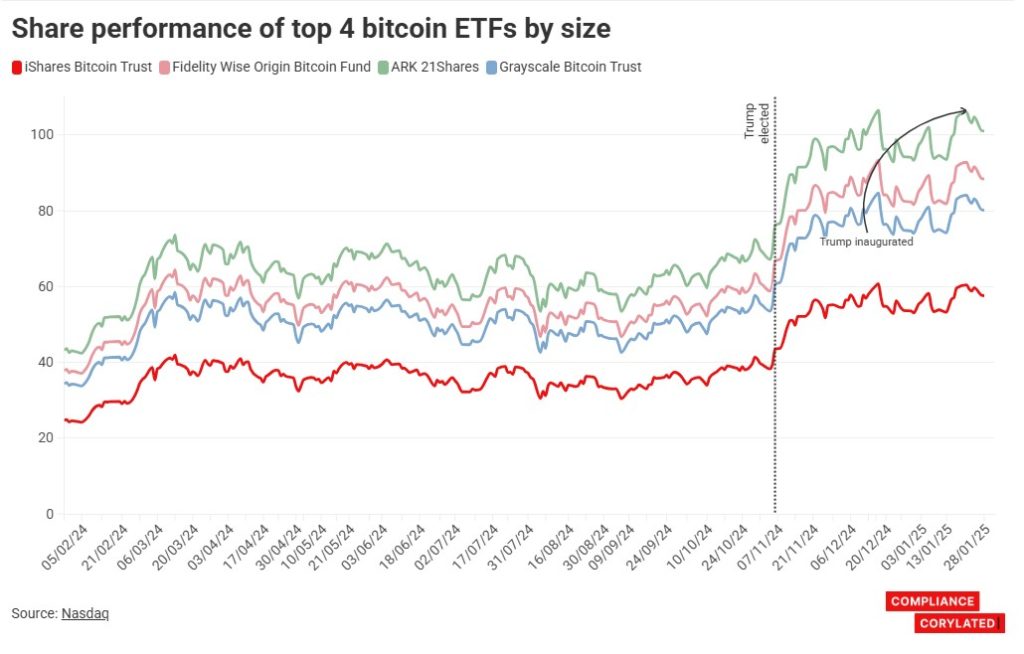Digital Assets
Bitcoin ETF: SEC approval one year on
• 0 minute read
January 31, 2025

Many in the digital asset investment community celebrated the decision by the Securities and Exchange Commission (SEC) to approve bitcoin exchange-traded funds (ETFs) in the US at the start of 2024.
However, the SEC’s hand was forced, after it lost a court battle. SEC then-chair Gary Gensler commented at the time that it “did not approve or endorse Bitcoin. Investors should remain cautious about the myriad risks associated with Bitcoin and products whose value is tied to crypto”.
A year later, the US has a new administration and soon-to-be-approved new SEC chair Paul Atkins is expected to create a more welcoming regulatory environment for cryptocurrencies and digital assets.
Nevertheless, bitcoin price volatility and the changing US regulatory environment are still being monitored by the industry.
Gateway to ecosystem
Spot bitcoin ETFs hold bitcoins in a secure digital vault, managed by registered custodians, mirroring its price in the crypto market. Exchange-traded products (ETPs) tied to the digital asset market have existed for several years globally: Canada’s first spot bitcoin ETF was listed in 2021, while Europe’s first ETF for spot bitcoin launched in 2023.
Proponents of bitcoin ETFs claim they offer opportunities for institutional and retail investors to speculate on Bitcoin without the technical challenges of managing a cryptocurrency wallet or the security concerns of safeguarding private keys.
“The first year of spot bitcoin ETF trading was a massive success, with the market experiencing $36.2 billion of net inflows,” said Christopher Perkins, president of investment firm CoinFund. “It has shown the pent-up demand for this asset class, and will serve as a gateway into the greater crypto ecosystem.”
Despite that, a report from cryptocurrency exchange Binance released in October 2024 claims 80% of demand for bitcoin ETFs came from retail investors, not the institutional market. Binance’s research claimed buying activity is tied to retail investors moving their holdings from digital wallets and centralised exchanges into the funds, which offer increased regulatory protections.

Making history, not noise
The structured regulatory environment presented by the new ETFs “handed Bitcoin a seat at the grown-ups’ table”, according to Lisa Hough, founder of Eberly Energy Ventures.
“What’s remarkable isn’t just the adoption, it’s the transformation. Bitcoin has gone from the renegade in the crowd to the steady anchor in a world of inflation and uncertainty. It’s no longer making noise; it’s making history,” added Hough.
According to reporting by news channel CNBC, there are now almost $113 billion in bitcoin ETFs, a little more than 1% of the assets under management in all exchange-traded funds.
Since they began trading in 2024, spot Bitcoin ETFs have seen net inflows of roughly $36.2 billion, according to Farside Investors. Some of the largest include the iShares Bitcoin Trust (IBIT), which saw net inflows of nearly $38 billion, and the Fidelity Wise Origin Bitcoin Fund, with more than $10 billion in inflows. Others include the Bitwise Bitcoin ETF and ARK 21Shares Bitcoin ETF, which also had fund inflows in the billions.
CNBC reported that IBIT’s assets under management sit at $52.9 billion as of January 19, 2025.
Concerns over volatility persist
However, risk from Bitcoin’s price volatility still concerns many. Manish Chandna, senior director, consulting and corporates at Acuity Knowledge Partners, said: “Despite the approval of bitcoin ETFs in the US, significant volatility within digital assets persists, raising concerns as sharp price fluctuations are driven more by market sentiments than economic fundamentals.”
Despite this, the acceptance of bitcoin ETFs by institutional investors and regulators marks “a significant step towards the maturation of this asset class”. Readiness from banking and fintech sectors, including companies such as Bank of America, BNY Mellon and Visa, point to positive market response, driven by significant involvement from institutional investors, Chandna said.
“However, the current price momentum is subject to short-term corrections as the market awaits final regulatory amendments post-Trump win and pro-crypto stance,” he cautioned.
He predicted the ongoing regulatory reforms would pave the way for a wider variety of crypto ETFs, and establish a comprehensive framework for digital assets. “This includes regulations for stablecoins, the creation of strategic reserves and improved risk infrastructure, while building a digital asset stockpile from seized cryptocurrencies.”
The crypto conundrum
Coinfund’s Perkins argued that “crypto” is a technology and “it simply does not make sense to describe a technology as an investment or as speculation”.
Cryptocurrencies allow for the tokenisation of assets, enabling assets such as private property to exist on the internet. “Like traditional markets, some of those assets are investments, while others can be used for speculation. Many are both,” he adds.
However, Hough doesn’t describe Bitcoin as crypto. “It’s digital scarcity, the purest form of money ever created — more akin to property than a speculative plaything,” she says. “The ETF launch didn’t just validate Bitcoin; it spotlighted the growing institutional demand for what’s real and lasting.”
Under Gensler, the SEC was concerned with issues around market manipulation and custodial risk. It was forced to allow bitcoin ETFs after a US court ruled in 2023 that it was wrong to reject an application from crypto asset manager Grayscale Investments.
Grayscale argued that market manipulation safeguards it used for bitcoin futures ETFs, which had been approved by the SEC, were satisfactory since both products are tied to Bitcoin’s underlying price. The SEC disagreed but the US appeals court sided with Grayscale.
The US’s first 11 bitcoin spot ETFs were approved on January 10, 2024, while bitcoin futures ETFs have already been trading on CBOE since 2021.